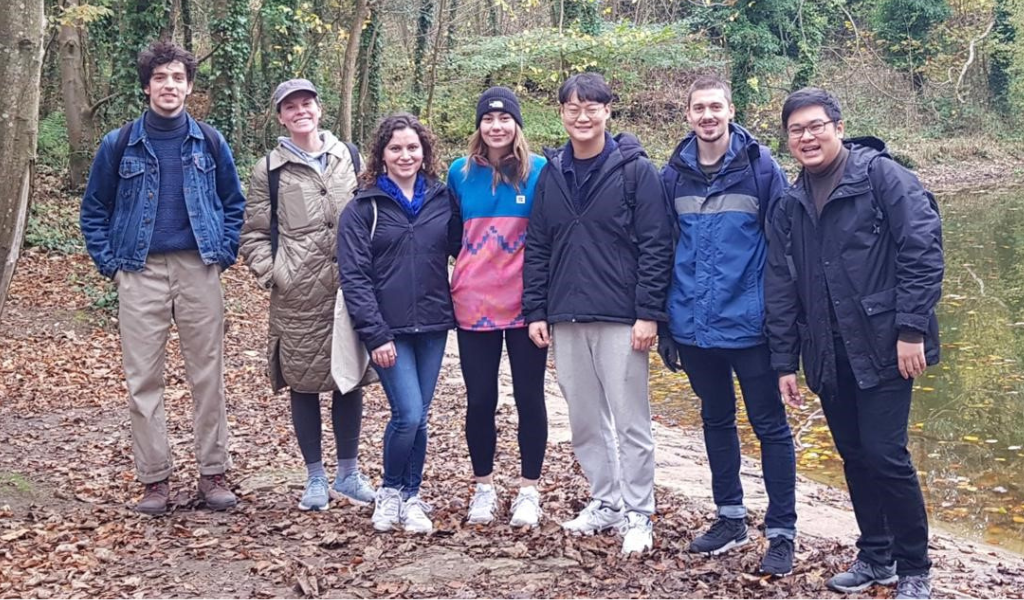IDS graduates Callum Chapman and Norma Jean Park (MA Food & Development, Class of 2024) were lead authors on the IDS Working Paper Towards Transformative Change: Grass-roots Innovations for Food Security During Crises in Brighton & Hove, UK.
This Working Paper analyses the emergence and evolution of three community-led initiatives focused on food insecurity, with the coronavirus (Covid-19) pandemic and the ensuing cost-of-living crisis as the backdrop.
“The Paper highlights the resilience of these projects and their communities,” says Callum, whose interest in development and food-related issues was piqued through modules he undertook in his undergraduate degree in Human Geography at Sheffield Hallam University, and by volunteering with Community Food Projects and working in the hospitality industry.
The Brighton & Hove (UK) initiatives featured in the Working Paper are:
- Chomp, a free holiday lunch club catering to families on low incomes
- Rock Farm, a community space and horticultural therapy project located in the outskirts of the city
- Brighton Food Factory, a social enterprise initially conceived as a warehouse for storing gleaned food from local farms and processing it into affordable ready-to-eat meals for low-income individuals.
“By understanding how these projects innovated and collaborated with their communities and each other, we can highlight how we can move towards food justice,” says Callum. “Additionally, they show how smaller projects can meet demand during times of crises by using and subsequently strengthening existing community networks. The success of these projects in supporting their communities demonstrates a snippet of what would be possible in the wider food system with more funding and support.”

Studying and working at IDS
Before coming to IDS, Norma was an apprentice on an organic farm in Denver, Colorado, in the USA, whilst working as a medical assistant at a sexual and reproductive health clinic. She decided to study MA Food & Development because it was one of the few programmes that examined the the political dimensions of food.
“It takes a holistic approach, exploring food as a cross-cutting issue that intersects with the environment, social justice, culture, nutrition, and agriculture,” she says.

While at IDS, both Callum and Norma were invited to join the team working on the Building Back Better from Below (B4) project, as Research Assistants. This project documents, analyses and draws wider lessons from the community collaborations that emerged during Covid-19 in the cities of São Paulo (Brazil), Toronto (Canada) and Brighton (UK), and the subsequent innovations in health and food justice.
Callum and Norma’s supervisors at IDS identified that the research they did as part of this project, which included conducting, recording, and transcribing interviews with leaders from the three local community food projects, drafting interview questions and facilitating conversations to understand how these grassroots initiatives adapted and evolved in response to the pandemic, could be developed into a Working Paper.
Callum says the most significant learning from the Working Paper was how the disruption of established norms by the pandemic allowed for quick implementation of ideas and innovations by the three focus projects. “These innovations helped provide swift, effective support to deprived communities and families,” he said. “The projects were able to react quickly in providing crucial support during this time of crisis by using their deep community knowledge and established groundwork.”
Similarly for Norma, the most significant takeaways are the lessons in agility and community-embeddedness. “While grassroots community food movements may seem small in scale, especially when compared to the vast industrial agri-food system, their embeddedness in local communities makes them uniquely powerful agents of change,” she said. “Their agility allows them to respond quickly and meaningfully to systemic shocks, such as Covid-19 or the ongoing food-price crisis. This ability to adapt and mobilise at the local level is what makes them such an important force in shaping a more just and resilient food system.”
Crucial skills
This is Norma’s first published paper, which is a huge milestone in her career. Since graduating from IDS, she has moved to Brighton & Hove where she works remotely as a Water Resources Project Manager with the Environment Agency. Her role is to oversee projects aimed at helping the agricultural sector build resilience to water scarcity.
Her master’s degree and research assistant experience played a crucial role in securing her current job. “While I hadn’t previously worked as a project manager, my experience working with diverse stakeholders in Brighton & Hove’s agri-food sector gave me the transferable skills that now help me navigate and manage the many stakeholders I engage with,” she says. “I want to continue working at the intersection of top-down policy change and bottom-up grassroots movements. Right now, my work focuses more on the policy side, collaborating with both farmers and regulators. In the long-term, I dream of launching my own grassroots food project, one that promotes food sovereignty and uses food as a means to bring communities together.”
Callum, who had previously cowritten a report with the Eastbourne Food Partnership and contributed to an IDS briefing as part of the B4 project, now works at the Brighton & Hove Food Partnership’s Community Kitchen, which empowers people to take control of their health and wellbeing, learn cookery skills, and connect with their community. He remains passionate about equitable access to healthy food for all.
For more information about this degree, click below:
To find out regular updates from our postgraduate programme and how it can support your career development or fulfil a passion, you can subscribe to our Learn newsletter.
